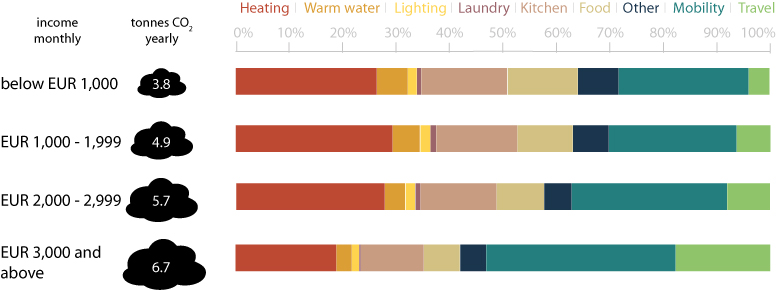Good intentions, big footprints: Facing household energy use in rich countries
This CDE policy brief looks at energy-related household carbon footprints. Scientists agree that human activity – above all emission of CO2 by burning fossil fuels – is altering our climate. The risks of maintaining this carbon-burning trajectory – including sea level rise, ocean acidification, more frequent droughts and other extreme weather events, population displacements, and resource conflicts – make it imperative to change course. This means drastically reducing our dependence on fossil fuel-based energy as quickly as possible. Households account for a large share of CO2 emissions, especially in rich, consumption-driven economies. But which households consume the most energy and how could their carbon footprints be reduced?

Historically, the top 5 CO2 producing countries are the US, China, Russia, Germany, and the UK (total cumulative emissions, 1850 to 2007). These countries are largely accountable for the unprecedented concentration of CO2 that has collected in Earth’s atmosphere – a global common.
Of course, high emitters like China and India partly do so producing goods for Western consumers. Indeed, if we re-rank countries based on the emissions embodied in goods consumed (per person), a small country like Switzerland shoots to the top of the European rankings (no. 17 globally) ahead of even Germany (no. 34) and not far behind the US (no. 11).
These rankings show vividly that richer, industrialized countries retain some of the biggest carbon footprints globally, while significant growth in other countries is also tied to rising carbon pollution.
What are the biggest drivers of household energy consumption?
Visualisation by Christoph Bader modified based on the tutorial from zeroviscosity
Energy use is by far the biggest cause of emissions – accounting for 79% of all CO2 emitted in the EU. Industrial sectors (e.g. steel) play a big role, but so do private households. Indeed, private households are a major – frequently underrated – contributor to energy-related CO2 emissions.
Read the Policy Brief online:
Moser S, Lannen A, Kleinhückelkotten S, Neitzke HP, Bilharz M. 2016. Good intentions, big footprints: Facing household energy use in rich countries. CDE Policy Brief, No. 9. Bern, Switzerland:CDE.
Suggested further readings:
- Kleinhückelkotten S, Neitzke HP, Moser S. 2016. Repräsentative Erhebung von Pro-Kopf-Verbräuchen natürlicher Ressourcen in Deutschland (nach Bevölkerungsgruppen) [Representative survey of per capita consumption of natural resources in Germany (by population group)]. Dessau-Rosslau, Germany: German Federal Environment Agency. ISSN 1862-4804. https://www.umweltbundesamt.de/publikationen/repraesentative-erhebung-von-pro-kopf-verbraeuchen
- Bilharz M, Schmitt K. 2011. Going big with big matters: The key point approach to sustainable consumption. GAIA – Ecological Perspectives for Science and Society 20(4):232–235. http://www.ingentaconnect.com/content/oekom/gaia/2011/00000020/00000004/art00005?crawler=true
- Steininger KW, Lininger C, Meyer LH, Muñoz P, Schinko T. 2016. Multiple carbon accounting to support just and effective climate policies. Nature Climate Change 6:35–41. http://www.nature.com/nclimate/journal/v6/n1/full/nclimate2867.html


